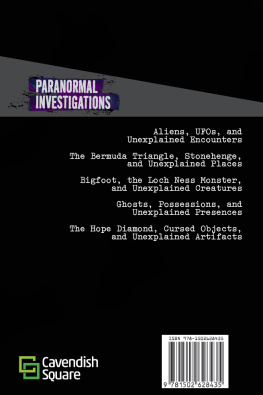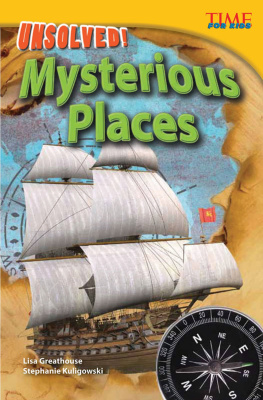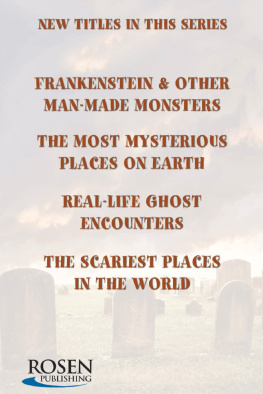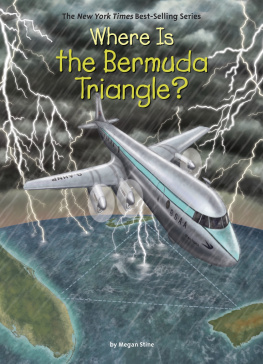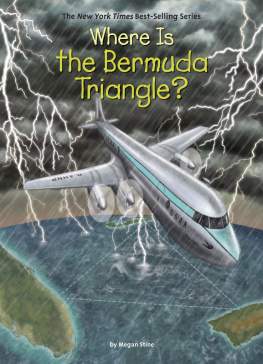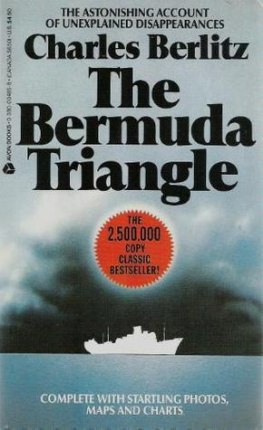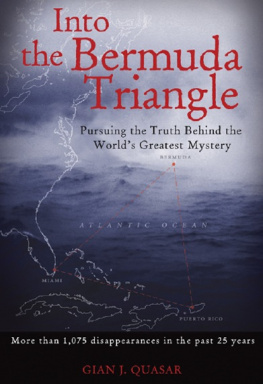PARANORMAL
INVESTIGATIONS
The Bermuda Triangle, Stonehenge,
and Unexplained Places
Andrew Coddington
Published in 2018 by Cavendish Square Publishing, LLC
243 5th Avenue, Suite 136, New York, NY 10016
Copyright 2018 by Cavendish Square Publishing, LLC
First Edition
No part of this publication may be reproduced, stored in a retrieval system, or transmitted in any form or by any meanselectronic, mechanical, photocopying, recording, or otherwisewithout the prior permission of the copyright owner. Request for permission should be addressed to Permissions, Cavendish Square Publishing, 243 5th Avenue, Suite 136, New York, NY 10016.
Tel (877) 980-4450; fax (877) 980-4454.
Website: cavendishsq.com
This publication represents the opinions and views of the author based on his or her personal experience, knowledge, and research. The information in this book serves as a general guide only. The author and publisher have used their best efforts in preparing this book and disclaim liability rising directly or indirectly from the use and application of this book.
Cataloging-in-Publication Data
Names: Coddington, Andrew.
Title: The Bermuda Triangle, Stonehenge, and unexplained places / Andrew Coddington.
Description: New York : Cavendish Square Publishing, 2018. | Series: Paranormal investigations | Includes index.
Identifiers: ISBN 9781502628435 (library bound) | ISBN 9781502628442 (ebook)
Subjects: LCSH: Geographical myths--Juvenile literature. | Stonehenge (England)--Juvenile literature. | Bermuda Triangle--Juvenile literature.
Classification: LCC GR940.K55 2018 | DDC 398.234--dc23
Editorial Director: David McNamara
Editor: Kristen Susienka
Copy Editor: Rebecca Rohan
Associate Art Director: Amy Greenan
Designer: Joseph Macri
Production Coordinator: Karol Szymczuk
Photo Research: J8 Media
The photographs in this book are used by permission and through the courtesy of: Cover Nick Turner/NPL/Getty Images; p. Mavratti/Wikimedia Commons/File:Stonehenge on 27.01.08.jpg/ Public Domain.
Printed in the United States of America
Although science has shed light on many of the worlds mysteries, there are several places, such as Stonehenge, that remain unexplained.
INTRODUCTION
A Dive into History
H umans have been exploring the world around them since our ancestors first stepped out of caves and into the open air. At first, many did so in order to find resources to live a better life. Scientists believe that todays species of humans, called homo sapiens, which in Latin translates into wise man, first originated in Africa approximately two hundred thousand years ago. These early humans spread out from their homelands in search of areas with more fertile soil, better hunting, a more comfortable climate, or to get away from rival clans. This migration took humans out of Africa and into the Middle East, and from there to Europe and Asia and, eventually, all the way to the Americas, and even remote islands in the Pacific Ocean. Today, humans live on every continent, including Antarctica, the coldest and most hostile place to humans on Earth.
Movement seems like an innate human need. As the saying goes, the grass is always greener on the other side of the fence, and so people press on, exploring new lands. In todays world, however, it seems like the entire planet has already been explored. People romanticize about the great European Age of Exploration, lasting between the fifteenth and seventeenth centuries. During this time, people wondered what existed outside their narrow scope of the world, imagining lands filled with untold riches and protected by seas haunted by monsters. Sailors and sea captains left their homes to sail into the unknown, uncharted waters that lay beyond the horizon. Today, it would seem their work is complete. Humans instead have turned their attention to space, calling it the final frontier. Global positioning system (GPS) satellites orbit Earth, charting every possible corner of the world, and scientists working around the world have categorized and explained all of the worlds mysteries Or have they?

A network of global positioning system (GPS) satellites orbiting Earth has documented every corner of our planets surface.
Mysteries of the Deep
As much as we have already explored, we still have a narrow scope of the world. For example, living on land, it may seem like we have a pretty clear understanding of the world we find ourselves in. If one looks at a map of their home country, the United States or Canada for example, it may seem like those countries take up a huge amount of Earths surface. This isnt wrong: the United States and Canada both take up about 3.8 million square miles (9.8 million square kilometers) each. However, the whole world measures approximately 197 million square miles (510 million sq km), and over 70 percent of that is water. This means that nearly 140 million square miles (360 million sq km)or eighteen times the area of the United States and Canada combinedis water.
Water, unlike land, takes up three-dimensional space. Generally speaking, a person on land can only move around on one planehorizontallybut a creature in the water can travel in two planeshorizontally and vertically. This is because water, unlike land, has depth. Most of the water on Earth is contained in the oceans. The average depth of the ocean is about 12,100 feet (3,688 meters), or 2.3 miles (3.7 kilometers), but there are even greater depths. The deepest part of the ocean is called the Challenger Deep, which is located along the southern end of the Mariana Trench in the Pacific Ocean. Here, depths reach up to a staggering 36,200 feet (11,033.76 m), or 6.8 miles (11 km).
Oceans are obviously big places, so it should be no surprise that we have explored only the barest sliver of them. Even with all of humanitys advanced technologies, such as sonar and manned and unmanned submarines capable of withstanding the crushing pressure experienced at great depths, we have only explored a measly 5 percent of the seas, according to oceanographers. This means that humans have little to no idea of 95 percent of the oceans surrounding our continents.
Ancient Mysteries
What is contained in the expanse of the oceans is just one of the worlds many great mysteries, and one of the greatest puzzles revolves around something else entirely: ourselves. As much as we dont understand about the seas, there is perhaps even less that we know about the history of humanity itself. As previously mentioned, homo sapiens have been on Earth for thousands of years. However, humans have only been able to record their histories through writing for a fraction of that time. Writing was invented first in 3200 BCE in Mesopotamia in modern-day Iraq, and later independently by the Mesoamerican culture known as the Olmecs in 600 BCE. This means that humans have only been able to record their histories through writing for barely more than 1/100th of the time they have been on Earth.
Archaeologists, such as these digging in Orkney off the coast of Scotland, work to explain the parts of ancient history that have been lost to us.
Next page
